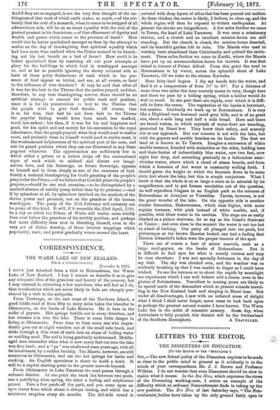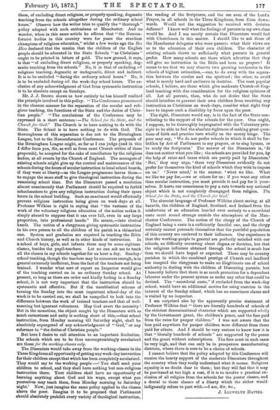LETTERS TO THE EDITOR.
THE DISSENTERS ON EDUCATION.
[TO THE EDITOR OF THE " SPROTATOR.1
SIR, —The new School policy of the Dissenters requires to be made as clear to the public mind in general as it evidently is to the minds of your correspondents Mr. J. J. Brown and Professor Wilkins. I do not wonder that even Dissenters should be slow to realize what it means. In the Bee Hive, which expresses the views of the Dissenting working-men, I notice an example of the difficulty which an ordinary Nonconformist finds in taking up the new position. The Bee Hive of last Saturday says, " The Non- conformist bodies have taken up the only ground fairly open to
them, of excluding direct religious, or properly speaking, dogmatic teaching from the schools altogether during the ordinary school tours." Observe how the writer tries to qualify the " thorough " policy adopted with such enthusiasm at Manchester. And no wonder, when in this same article he affirms that "the Noncon- formist bodies in this country were for years the sturdiest champions of religious education," whilst a few weeks ago the Bee Hive declared that the maxim that the children of the English people should be educated in the State Schools "as Christians" ought to be printed in letters of gold. The new ground, it says, is that "of excluding direct religious, or properly speaking, dog- matic teaching from the schools." No, it is that of excluding all religious teaching, dogmatic or undogmatic, direct and indirect. It is to be excluded " during the ordinary school hours." No, it is to be excluded during all the week-day school hours. The ex- -elusion of any acknowledgment of God from systematic instruction is to be absolute except on Sundays.
Mr. J. J. Brown shows us how entirely he has himself realized the principle involved in this policy. " The Conference pronounced in the clearest manner for the separation of the secular and reli- gious teaching, the functions of the State and the duties of Chris- tian people." "The conclusions of the Conference may be expressed in a short sentence : —The School for the State, and the Church for God." The Church is to have nothing to do with the State. The School is to have nothing to do with God. The thoroughness of this separation is due not to the Birmingham League, but to the Nonconformist Conference. The proposals of the Birmingham League might, so far as I can judge (and in this I differ from you, Sir, as well as from most Church critics of these proposals), be accepted for the sake of conciliation by the religious bodies, at all events by the Church of England. The managers of existing schools might give up the control and maintenance of the schools during the hours of secular instruction to local school boards, if they were at liberty—as the League programme leaves them— to engage the same staff to give theological instruction during the remaining school time. But the Dissenters passed a resolution almost unanimously that Parliament should be required to forbid schoolmasters to give any religious instruction during their spare hours in the school building. Such an enactment would effectually prevent religious instruction being given on week-days at all. Professor Wilkins is right in saying that " the vastness of the work of the voluntary religious education of the nation makes it simply absurd to suppose that it can ever fall, even in any large proportion, into professional hands." He means,—into clerical hands. The notion of a clergyman giving systematic instruction in his own person to all the children of his parish is a chimerical -one. System and gradation are required in teaching the Bible and Church history, as well as in other kinds of instruction. In a school of boys, girls, and infants there may be some eighteen -classes, besides the pupil-teachers. Let no one ask me to teach all the classes in my schools together for an hour a day. Sunday-' kchool teaching, though the teachers may be numerous enough, is in general extremely inefficient, from the fact of the teachers not being trained. I wonder what sort of report an Inspector would give of the teaching carried on in an ordinary Sunday school. At present, so long as there are order and kindly feeling in a Sunday school, it is not very important that the instruction should be systematic and effective. But if the unsabbatical scheme of turning the Sunday into the most important school-day of the week is to be carried out, we shall be compelled to look into the difference between the work of trained teachers and that of well- meaning but ignorant volunteers. May God avert the necessity ! But in the meantime, the object sought by the Dissenters with so much earnestness and unity is nothing short of this,—that school instruction, from Monday morning till Saturday night, shall be absolutely expurgated of any acknowledgment of " God," or any reference to " the duties of Christian people."
But here I desire to call attention to an important limitation. The schools which are to be thus uncompromisingly secularized are those for the working-classes only.
The Dissenters would take away from the working-classes in the Three Kingdoms all opportunity of getting any week-day instruction for their children except that which has been completely secularized. They would say to the working people :—' You shall send your children to school, and they shall have nothing but non-religious instruction there. Your children shall have no opportunity of learning anything about God and his ways, except what you yourselves may teach them, from Monday morning to Saturday night.' Now, just imagine the same policy applied to the classes above the poor. Imagine it to be proposed that Parliament should absolutely prohibit every variety of theological instruction, the reading of the Scriptures, and the use even of the Lord's Prayer, in all schools in the Three Kingdoms, from Eton down- wards. Would not the suggestion be received with derisive defiance? I know well what the feelings of parents in my own class would be. And I am nearly certain that Dissenters would feel with Churchmen in this matter. I should like to ask those of the Manchester delegates who were parents what their views are as to the education of their own children. The character of existing schools shows us sufficiently what parents in general prefer. How many schools are there which advertise that they will give no instruction in the Bible and have no prayers? It seems to me that we may observe two growing tendencies in the schools of highest estimation,—one, to do away with the separa- tion between the secular and the spiritual ; the other, to avoid what is merely hard and exclusive in doctrine. The most popular schools, I believe, are those which give moderate Church-of-Eng- land teaching with due consideration for the religious opinions of all. Let all parents, then, who do not desire that the State should interfere to prevent their own children from receiving any instruction as Christians on week-days, consider what right they have to impose such a disability by force upon the poor.
The right, Dissenters would say, is in the fact of the State con-
tributing to the support of the schools for the poor. One ought, I suppose, to be thoroughly impregnated with the Voluntary prin- ciple to be able to feel the absolute rightness of making great ques- tions of faith and practice turn wholly on the money hinge. The poor may say, ' We do not prefer schools in which it shall be for- bidden by Act of Parliament to say prayers, or to sing hymns, or to study the Scriptures.' The answer of the Dissenters is, g It does not matter what you like ; the schools are provided for you, by the help of rates and taxes which are partly paid by Dissenters.'
But,' they may urge, these very Dissenters evidently do not prefer for themselves the kind of schools which they wish to impose
on us.' Never mind,' is the answer, 6 what we like. What we like we pay for,—we or others for us ; if you want any other than secular instruction, you must provide it and pay for it your- selves.. It hurts our consciences to pay a rate towards any national object which is not completely disengaged from religion. The School for the State, and the Church for God.'
The alarmist language of Professor Wilkins about saving, at all
hazards, the children of England, Scotland, and Ireland from the misfortune of an education handed over entirely to a sacerdotal caste must sound strange outside the atmosphere of the Man- cheater Conference. The notion of the clergy of the Church of England being a caste is a sufficiently fanciful one, and the clergy certainly cannot persuade themselves that the youthful population of this country are enslaved to their influence. Our experience is that the working-people in general are perfectly satisfied with our schools, no difficulty occurring about dogma or doctrine, but that the religious influence obtained through the school is much less than we should have hoped or expected. There may be country parishes in which the combined prestige of Church and landlord has tempted the clergyman to make an illegitimate use of school authority in dealing with the children of Dissenting parents, but I honestly believe that there is as much protection for a dependent labourer under the present system as under any other that could be devised. The "sacerdotal caste," if excluded from the week-day school, would have an additional motive for using coercion in the interest of the Sunday school, which has no conscience clause and is visited by no inspector.
I am surprised also by the apparently precise statement of Professor Wilkins that " there are literally hundreds of schools of the strictest denominational character which are supported wholly by the Government grant, the children's pence, and the fees paid from the rates for pauper children." I was not aware that the fees paid anywhere for pauper children were different from those paid for others. And I should be very curious to know bow it is that " literally hundreds of schools " are supported by the pence and the grant without subscriptions. The fees must in such cases be very high, and that can only be in prosperous manufacturing districts, where there is sure to be a choice of schools.
I cannot believe that the policy adopted by this Conference will receive the hearty support of the moderate Dissenters throughout the country when they really understand what it means. Religious equality is no doubt dear to them ; but they will feel that it may be purchased at too high a cost, if it is to involve a practical ex- clusion of all religion from the schools for the poorer classes, and a denial to those classes of a liberty which the richer would indignantly refuse to part with.—I am, Sir, &c.,
J. LLEWELYN DAVIES.



































 Previous page
Previous page